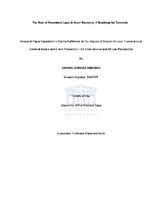The role of procedural laws in asset recovery: a roadmap for Tanzania research
Abstract
Corruption is rampant in Tanzania. It is one of the major obstacles to the economic growth and sustainability of the country. The country loses a huge amount of money through corrupt practices. It is estimated that 20% of the national budget is lost to corruption annually. In recent years, Tanzania experienced grand corruption scandals which involved senior public officials and high political leaders. Between 2005 and 2006, 22 companies stole 133 billion Tanzanian shillings, the equivalent of$96 million, from the External Payment Arrears Account facility at the Central Bank of Tanzania. The discovery of this theft led to the investigation and prosecution of a number of perpetrators, including big businessmen and senior officers of the Central Bank of Tanzania. However, hitherto no assets have been traced and recovered from the offenders, save a handful of money which was paid back by a few perpetrators on condition that they would not be prosecuted. Furthermore, in 2008 a government minister by the name of Andrew Chenge was forced to resign after he allegedly was implicated in taking a bribe of $1 million from the British company, BAE Systems, in relation to a $40 million radar deal. Sources disclosed that Chenge deposited the alleged bribe money in one of his offshore accounts, but this money has not been recovered by the state. In response to the corruption problem, Tanzania enacted various anti-corruption laws. These laws include the Anti-Money Laundering Act (2006), the Prevention and Combating of Corruption Act (2007), the Proceeds of Crime Act (1991) and the National Prosecutions Service Act (2007). These laws contain provisions for the confiscation of proceeds of crime as one means of combating economic crimes. However, grand corruption persists in the country and only a few stolen assets have been confiscated to date. It is on this account that this study is exploring confiscation procedures in Tanzania.

